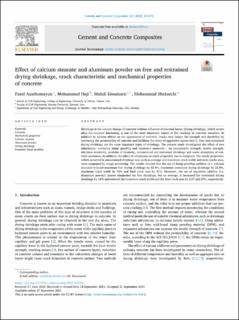Effect of calcium stearate and aluminum powder on free and restrained drying shrinkage, crack characteristic and mechanical properties of concrete
Peer reviewed, Journal article
Published version
Date
2021-10-05Metadata
Show full item recordCollections
Original version
Cement & Concrete Composites. 2022, 125 104276-?. https://doi.org/10.1016/j.cemconcomp.2021.104276Abstract
Shrinkage is the volume change of concrete without influence of external forces. Drying shrinkage, which occurs after the concrete hardening, is one of the most important causes of the cracking in concrete members. In addition to adverse effects on the appearance of concrete, cracks may reduce the strength and durability by increasing the permeability of concrete and facilitate the entry of aggressive agents into it. Free and restrained drying shrinkage are the most important types of shrinkage. The present study investigated the effect of two admixtures—including damp proofing and expansive materials— on compressive strength, tensile strength, electrical resistivity, modulus of elasticity, unrestrained and restrained shrinkage and water absorption of concrete specimens. In addition, the effect of admixtures on crack properties was investigated. The cracks properties, which occurred in unrestrained shrinkage test, such as average and maximum crack width and total cracks area, were computed by image processing. The results showed that the use of damp proofing additive, (i.e. calcium stearate) reduced maximum free drying shrinkage by 42.4%, maximum restrained drying shrinkage by 22.8%, maximum crack width by 51% and final crack area by 21%. Moreover, the use of expansive additive (i.e. aluminum powder) almost eliminated the free shrinkage, but on average, it increased the restrained drying shrinkage by 18% and reduced the maximum crack width and the final crack area by 2.67 and 27%, respectively

